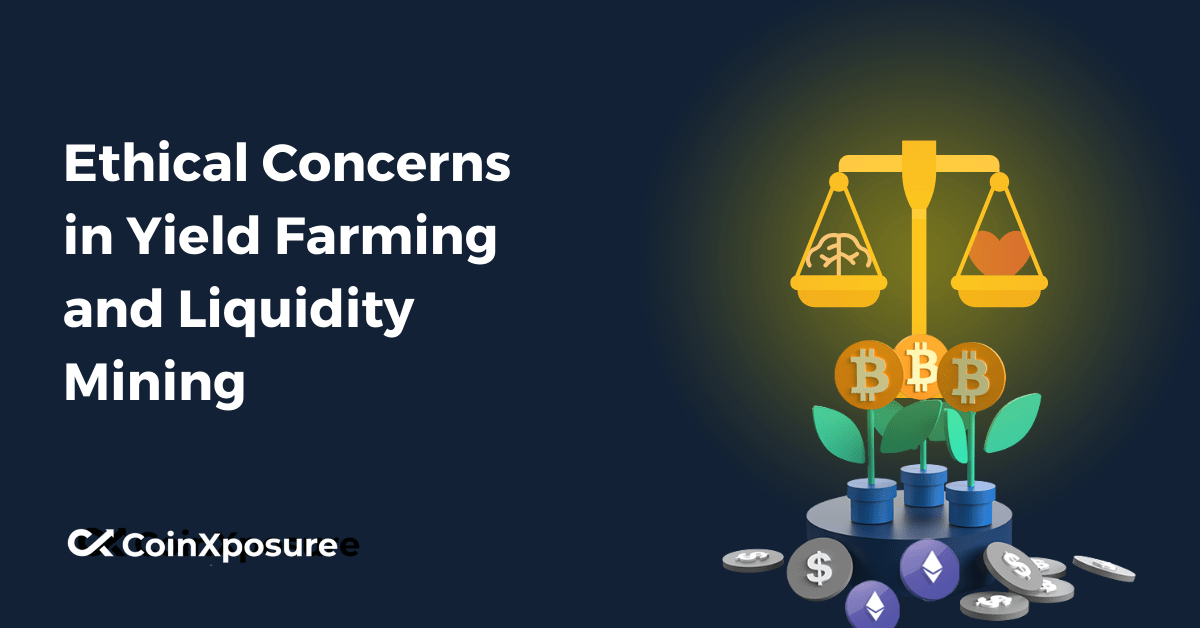
Ethical Concerns in Yield Farming and Liquidity Mining
Yield farming and liquidity mining have emerged as prominent phenomena within the decentralized finance (DeFi) ecosystem, offering lucrative opportunities for participants to earn rewards by providing liquidity to various protocols.
However, alongside their rapid growth and popularity, ethical concerns have surfaced, prompting critical examination of the practices involved.
Ethical considerations in yield farming and liquidity mining encompass a range of issues, including impermanent loss, centralization risks, insider trading, smart contract vulnerabilities, and environmental impact.
Addressing these concerns is vital to ensure the integrity, fairness, and sustainability of these decentralized financial activities.
This essay explores the ethical dimensions of yield farming and liquidity mining, highlighting their implications for participants, the broader DeFi landscape, and the evolving regulatory environment.
Ethical Concerns in Yield Farming and Liquidity Mining
Ethical concerns in yield farming and liquidity mining arise from various practices and their potential implications. Some of the key ethical concerns include:
- Impermanent Loss
- Centralization Risks
- Insider Trading and Information Asymmetry
Impermanent Loss
Liquidity providers face the risk of impermanent loss, where the value of their assets relative to simply holding them fluctuates due to changes in asset prices.
This raises questions about the fairness of the compensation provided to liquidity providers compared to the risks they undertake.
Centralization Risks
Yield farming and liquidity mining often incentivize large players to dominate liquidity pools, potentially leading to centralization.
This can undermine the decentralized nature of DeFi protocols, reducing accessibility and fairness for smaller participants.
Insider Trading and Information Asymmetry
There is a risk of insider trading and information asymmetry in yield farming and liquidity mining, where certain participants may have access to privileged information or exploit their position for personal gain, disadvantaging others.
Addressing these ethical concerns requires a combination of transparency, accountability, risk management, and regulatory oversight to promote fairness, integrity, and sustainability in yield farming and liquidity mining practices.
Regulatory Challenges in Yield Farming and Liquidity Mining
Regulatory challenges pose significant hurdles to addressing ethical concerns in yield farming and liquidity mining. Some of the key regulatory challenges include:
- Lack of Clarity and Oversight
- Jurisdictional Issues
- Compliance with Existing Regulations
Lack of Clarity and Oversight
Regulatory frameworks governing yield farming and liquidity mining are often unclear or nonexistent in many jurisdictions.
This ambiguity makes it challenging for participants to understand their legal obligations and for regulators to enforce compliance effectively.
Jurisdictional Issues
DeFi protocols operate across borders, complicating regulatory oversight and enforcement efforts.
Jurisdictional conflicts may arise when different countries have divergent regulatory approaches or when decentralized protocols lack a clear legal entity to regulate.
Compliance with Existing Regulations
Yield farming and liquidity mining activities may trigger various regulatory requirements, such as securities laws, anti-money laundering (AML) regulations, and tax obligations.
However, navigating these regulations within the context of decentralized and permissionless protocols presents significant compliance challenges.
Addressing these regulatory challenges requires collaboration between industry stakeholders, policymakers, and regulators to develop clear and balanced regulatory frameworks that protect investors, promote market integrity, and foster innovation in DeFi while addressing ethical concerns in yield farming and liquidity mining.
However, achieving regulatory clarity and consensus in the decentralized and globalized landscape of DeFi remains a complex and ongoing process.
Mitigation Strategies in Yield Farming and Liquidity Mining
Mitigation strategies are essential for addressing the ethical concerns and regulatory challenges associated with yield farming and liquidity mining. Here are some key mitigation strategies:
- Transparency and Disclosure
- Risk Management Protocols
- Regulatory Compliance Measures
Transparency and Disclosure
Platforms and projects should prioritize transparency by providing clear and comprehensive information about the risks, rewards, and mechanics of yield farming and liquidity mining.
This includes disclosing details about token distribution, governance mechanisms, and potential impermanent loss risks to enable informed decision-making by participants.
Risk Management Protocols
Implementing robust risk management protocols can help mitigate the impact of impermanent loss, smart contract vulnerabilities, and other risks associated with yield farming and liquidity mining.
This may involve diversifying liquidity across multiple pools, setting limits on exposure to specific assets, and using hedging strategies to minimize potential losses.
Regulatory Compliance Measures
Platforms and projects should proactively engage with regulators to ensure compliance with existing regulations, such as securities laws, AML requirements, and tax obligations.
This may involve implementing Know Your Customer (KYC) and AML procedures, obtaining necessary licenses or approvals, and adhering to reporting and disclosure requirements.
By implementing these mitigation strategies, platforms and projects can work towards addressing ethical concerns, managing regulatory risks, and promoting the long-term sustainability and integrity of yield farming and liquidity mining activities.
However, achieving these objectives will require collaboration and cooperation between industry stakeholders, regulators, and the broader DeFi community.
Conclusion
Yield farming and liquidity mining have revolutionized the decentralized finance (DeFi) landscape, offering lucrative opportunities for participants to earn rewards by providing liquidity to various protocols.
However, alongside their rapid growth and popularity, ethical concerns and regulatory challenges have emerged, requiring careful consideration and proactive mitigation strategies.
Ultimately, by prioritizing ethics, compliance, and responsible innovation, the DeFi community can foster a more resilient and inclusive financial ecosystem that benefits participants while mitigating risks and safeguarding against potential regulatory scrutiny.
However, achieving these objectives will require ongoing collaboration, vigilance, and adaptability as the DeFi landscape continues to evolve and mature.





